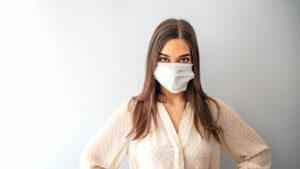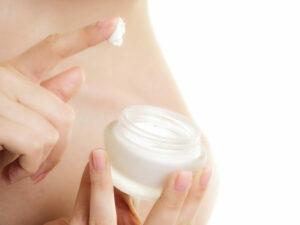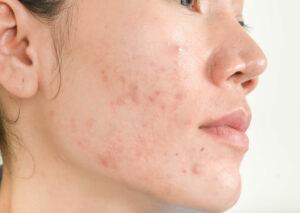Masks aren’t just for medical, construction, and other types of professionals anymore; they’re the item no one can’t afford to leave the house without. You put one on whether you’re running errands or meeting up for a socially-distanced outing. But now you’re noticing something unwelcome happening underneath your mask: a breakout around your nose, mouth, and chin.
“Maskne” — or mask-induced acne — may be new to the general public, but according to jaad.org, medical professionals and other men and women who wear masks daily for work have been battling this type of contact acne for decades. Healthcare workers on the frontline of the pandemic are reporting multiple skin issues related to the consistent wearing of masks, shields, and gloves.
There is some good news: we actually know a lot about maskne, despite not knowing nearly as much about the coronavirus, including why you get it and how to prevent it. Our team of board-certified dermatologists with 75+ years of combined experience here at Millburn Laser Center in Millburn, New Jersey, believe you should be able to have beautiful skin that you feel good in, no matter what the situation is in the world. If you’re battling mask acne while you’re doing your best to stay safe, here’s what you need to know to keep your skin clear while shielding yourself from the coronavirus.
Wash Your Mask Daily (Or More)
Just as you change your clothes daily and wash before re-wearing, you should be changing and washing your masks, so always keep a few to choose from on hand. If you wear a mask all day for your job, you might even consider changing your mask mid-day to avoid dirt build-up under your mask.
You can think of your mask as a regular piece of clothing you already change daily, like a shirt. If you sweat excessively one day, you might even change another time during the day. The same should be true for your mask. If you sweat under your mask, you don’t want to put that mask back on until it’s cleaned.

Acne from mask prevention tips.
Guard Against Face Friction
If you’ve played sports that require protective gear, you might have experience already with contact acne. When a piece of equipment (or a mask) rubs against your skin for a long time, especially when it’s hot out or when you’re exercising and sweating, the friction can cause enough irritation to trigger a breakout of acne. The addition of moistness caused by sweat or, in the case of masks, exhalations, creates a perfect environment to grow the types of bacteria that feast on oil and the dead skin in your pores. What comes next? Inflammation and a break out.
The first step in preventing severe friction is by choosing masks with comfortable material. You should be considering the types of fabric your masks are made from. While an N95 mask gives you the most protection, they aren’t necessary or appropriate for consumer wear.
The best non-medical masks are created from natural, breathable fabrics, such as cotton and silk, rather than thin layers of synthetic fabrics. If you are thinking about a neck gaiter, think again. The Washington Post reported that neck gaiters are actually worse for protecting others than no mask at all, because they break up respiratory droplets into smaller particles. Ideally, your masks consist of three layers of natural fabric that cover your mouth and nose completely.

Skin care. Moisturizing cream in female hands
Wear a light moisturizer
You might think wearing heavy skin products under your mask will increase your likelihood of breaking out. You’re right. You should be avoiding heavy make-up and greasy lotions, which trap moisture and increase the risk of irritation and breakouts. Wearing a light moisturizer or sunscreen can help reduce friction and also protect your skin, though.
One skin-related benefit of wearing a mask is that a mask intensifies the delivery of whatever skincare product you’re wearing. That’s one reason to skip intense skin treatments, such as retinoids and retinol, on your lower face. The enclosed environment of the mask could make these ingredients too irritating. Wearing a light moisturizer could give your skin exactly enough moisture when you’re wearing a mask.
Be gentle with your skin
Now’s the time to practice a gentle skincare routine. Lightly clean your skin no more than twice a day with a non-irritating, non comedogenic cleanser that is formulated for your skin type. Ask your dermatologist to provide a recommendation if you’re not sure which cleanser would be best for you.
Don’t forget the sunscreen
Sunscreen is always important, whether in the midst of a pandemic or not, but you really don’t want to neglect protecting your skin while wearing a mask outside. Your mask slightly shields your face from the sun, which could create a severely unbalanced tan: a suntanned upper face and paler lower face. Not a look you’d like to sport when your mask is off.

Scar from Acne on face
Treat Your Maskne
Just because your lower face isn’t usually public right now, you don’t have to tolerate pimples, cysts, rosacea, or irritation. Our team complies with the CDC’s COVID-19 protocols to ensure your safety when you come in for an office visit. If you suffer from acne caused by your mask, our dermatologists will examine your skin and recommend therapies, such as topical or oral medications and in-office treatments.
If left untreated, acne can leave scars. Our physicians are able to effectively treat acne scars with our wide selection of lasers and devices. In fact, as Millburn Laser Center has access to more lasers than any other practice in the area, we will be able to use just the right laser for your particular treatment needs.
Schedule A Consultation With Millburn Laser Center Today
Don’t suffer under your mask. Get your acne under control at Millburn Laser Center. Contact our Millburn, New Jersey office today or call us at 973.315.8590.

